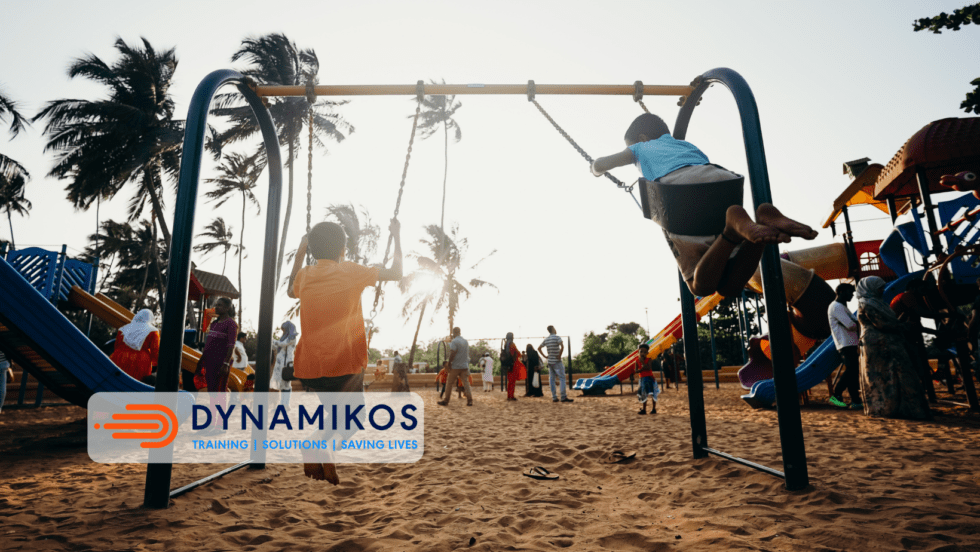
We were all once children: playing was our priority, and safety or the possibility of injury was what our superiors were trying to explain as we ran away to hang upside down on the monkey bars. As children do not prioritize their own safety, it’s our responsibility to protect them, and to prevent injuries where possible. As we know, the consequences of a bad fall can be fatal.
Before children begin playing, the playground should be inspected for any possible hazards. Upon inspection, anticipating what the children may do, will be beneficial to identify sections of the playground that should be focused on with laser vision.
Alongside ensuring that your child is playing in an age-appropriate playground, the following are tips to protect our fun-filled children.
1. SUPERVISING IS A SUPERPOWER
Ensure that there is always an adult within practical distance from the playground/area. This includes having clear sight and access to the children playing; this is relevant at schools and public play areas. While your child is playing in a public area, ensure that the individual minding your child is aware of your child and is trustworthy. In schools, ensure that there is a teacher watching each section of the play area.
2. BE ALERT AND ACTIVE
Children are going to swing higher and run faster than what you feel comfortable with. Being alert while the above is happening enables you to respond quickly. Should the injury require medical assistance, being aware allows you to contact emergency medical services promptly!
3. POOLS ARE FOR SWIMMERS
Is there a pool at your school, or household? Be aware of the children that cannot swim! Ensure that each child close to the pool is indeed able to swim. As they always say: prevention is better than cure.
It may be best to sit alongside those that cannot swim with their feet in the water, to avoid them feeling left out. This also enables full vision over the swimming pool, as most drownings are completely silent, and could easily be missed.
4. HOT TEMPERATURES ARE HIGH RISK
Avoid dehydration by ensuring that your/a child’s fluid intake is sufficient for the temperature experienced. Set up toys/games in shaded areas, dress children in loose clothing, and ensure constant hydration on hot days to avoid exhaustion and/or heat stroke.
Alongside the internal effects of extreme heat, young skins are extremely sensitive. Unprotected sun exposure can cause second degree burns on vulnerable skin. A simple solution: sunblock! Sunblock assists in protecting the skin against the harmful effects of the sun.
5. TREATING BITES & BUMPS
Remain calm while attending to a bump, bruise or bite. Should you have missed the incident, remaining composed could allow the child to calmly explain what happened. Determine whether the child has had a mild or severe reaction. Minor discomfort and swelling can be eased with a cold pack, however, should the reaction be severe, contact the child’s parents immediately. If it’s your child, call emergency medical services.
6. CLASSROOM CHAOS
Are you a teacher? This one’s for you! Accidents are not limited to the outdoors, as you may know. Children trip, knock, bump and get overly excited within classroom environments too. Maintaining control within the classroom, limiting games and activities to the space available to you, and moving any obvious sharp edges where possible, could be the difference between a gaping wound and a minor bruise.
Remain calm in the event of an accident, request that the other children move away from the injured, to give the child space and to avoid additional (unnecessary) attention.
Our children are our future, protecting them, and ensuring their safety should be important to all. Small changes make big differences, and small humans have the potential to make big differences too.
The ultimate way to ensure children’s safety, as a teacher, guardian, parent, or au pair is to expect, and be prepared for, the unexpected. The chances of a child being stung by a bee in their bedroom is low, but is it possible? Yes!
Being trained in first aid (paediatric first aid specifically) is extremely beneficial to anyone handling children. What to do when a child starts choking? Drowning? Bleeding? How do you handle insect bites? Anaphylaxis? All questions which are answered in our Paediatric First Aid and Basic CPR course.
We would love to hear from you! Share any tips you may have for parents, or individuals working with children.

